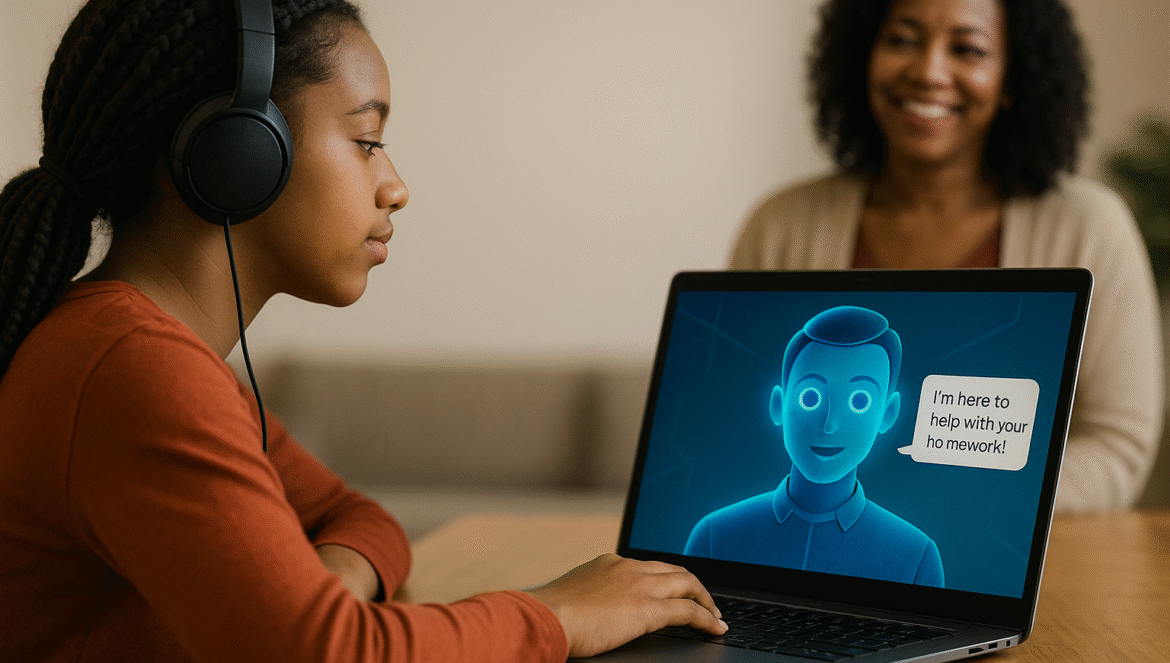Table of Contents
Artificial intelligence (AI) is reshaping how students learn, offering personalized, instant academic support once only available through one-on-one tutoring. Tools like Khanmigo, Google’s LearnLM, and other emerging AI platforms are quickly becoming silent partners in education. As AI-generated tutoring gains momentum, it forces a fundamental question: Will AI elevate learning for all students — or deepen the divides in our schools? The answer depends on how educators, policymakers, and communities respond today.
The Promise of AI Tutoring: Personalized, On-Demand Support
At its best, AI tutoring systems offer:
-
24/7 Availability: Students no longer need to wait for office hours or tutoring appointments. Help is available instantly.
-
Personalized Instruction: AI can analyze a student’s past performance and tailor explanations, examples, and practice problems to fit their unique needs.
-
Scalability: Schools facing teacher shortages or large class sizes can use AI to ensure every student still receives individual attention.
-
Affordability: Compared to private tutors, many AI solutions are low-cost or free, democratizing access to academic support.
-
Data-Driven Insights: Teachers can receive reports highlighting where individual students or entire classes are struggling, allowing more targeted instruction.
Changing the Role of Teachers
Rather than replacing teachers, AI tutoring shifts their role:
-
Facilitators of Deeper Learning: With AI handling repetitive practice, teachers can focus more on complex discussions, critical thinking, and creativity.
-
Data-Driven Decision Makers: Teachers can use AI-generated insights to adjust lessons, group students, or intervene earlier with struggling learners.
-
Mentors and Guides: With foundational skills reinforced by AI, teachers can focus more on social-emotional support, motivation, and mentoring.
However, this shift requires professional development. Teachers must understand how to interpret AI data, integrate AI into lesson planning, and ensure that AI is used ethically and responsibly.
Equity and Access: A Growing Divide?
A major concern is that not all students will benefit equally:
-
Access to Technology: Students in under-resourced communities may not have reliable devices or internet access.
-
Quality of Tools: Wealthier districts may afford premium AI platforms offering richer features and more accurate personalization.
-
Bias in AI: Algorithms trained on non-diverse data sets may deliver less effective or even misleading support to minority or special-needs students.
Without careful policy-making and investment, AI tutoring could widen existing educational disparities rather than close them.
Student Dependency vs. Skill Development
There is a risk that students may become too reliant on AI tutors:
-
Surface-Level Understanding: If students treat AI as an “answer machine” rather than a learning partner, they may struggle with deeper comprehension.
-
Critical Thinking Erosion: Constant, immediate feedback might discourage students from wrestling with difficult problems and developing grit.
-
Ethical Concerns: Students may also use AI to complete assignments dishonestly if guidelines are not clear and enforced.
Educators must teach students how to use AI responsibly—as a tool for growth, not a shortcut.
Policy and Ethical Implications
School leaders and policymakers must grapple with:
-
Curriculum Integration: How will AI tutoring be incorporated into official learning plans?
-
Data Privacy: How are students’ learning patterns and personal information being protected?
-
Quality Assurance: How do we vet AI tutors for accuracy, inclusiveness, and developmental appropriateness?
-
Professional Development: How do we ensure teachers are trained to work effectively alongside AI systems?
Clear guidelines, certifications for AI tools, and oversight mechanisms will be essential to harness the promise of AI tutoring responsibly.
The Future: AI Tutors as Study Buddies, Not Replacements
Imagine a future where AI tutors do more than answer questions. They might:
-
Ask students Socratic questions to deepen their thinking.
-
Simulate debates or peer discussions.
-
Offer emotional encouragement during study sessions.
-
Help students set personalized academic goals.
In this vision, AI is not a replacement for human teachers but an enhancement—a study buddy that fosters independence, curiosity, and resilience.
The Call to Act Thoughtfully
Handled wisely, AI tutoring can unlock an era of more personalized, equitable learning. But it won’t happen automatically. Schools must invest in teacher training, ensure fair access to technology, create ethical standards for AI use, and design policies that keep human connection at the heart of education.
If we act thoughtfully, AI won’t replace traditional education — it will reinforce it, helping every student not just to learn, but to thrive.
Subscribe to edCircuit to stay up to date on all of our shows, podcasts, news, and thought leadership articles.





